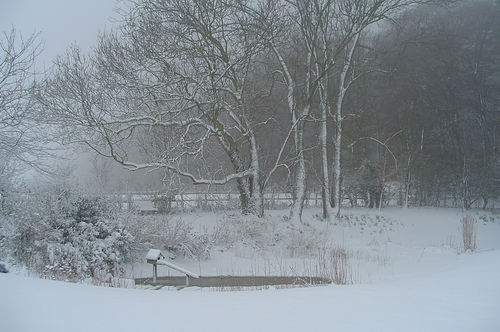Analyzing Irony in a Poem
In the following poem, Thomas Hardy, English novelist and poet of the late nineteenth to early twentieth centuries, makes use of irony to convey the speaker’s attitude toward a relationship. As you read “Neutral Tones,” try to determine what elements of the poem are ironic and how they help you not only understand, but also feel the speaker’s words.

Source: Pond in winter, Chelthan, Flickr
Neutral Tones
By Thomas Hardy
We stood by a pond that winter day,
And the sun was white, as though of God,
And a few leaves lay on the starving sod;
—They had fallen from an ash, and were gray.
Your eyes on me were as eyes that rove
Over tedious riddles of years ago;
And some words played between us to and fro—
On which lost the more by our love.
The smile on your mouth was the deadest thing
Alive enough to have strength to die;
And a grin of bitterness swept thereby
Like an ominous bird a-wing . . .
Since then, keen lessons that love deceives,
And wrings with wrong, have shaped to me
Your face, and the God-curst sun, and a tree,
And a pond edged with grayish leaves.
Answer these questions about the poem using your notes. Check your understanding after each question to see a sample response.
1. Consider the title. Why is it ironic?
Sample Response:
There is nothing neutral about the speaker’s attitude towards the relationship.
Close2. How do these diction choices contribute to the meaning of the poem—“stood,” “pond,” “winter,” “white,” “chidden,” “few,” “lay,” “starving,” “sod,” “ash,” “gray”?
Sample Response:
They connote stagnation, death, anger—symbolizing the “dead” relationship.
Close3. How does the switch from first-person plural point of view to second-person point of view at the beginning of the second stanza make you feel?
Sample Response:
It feels like someone is accusing me directly or pointing at me; nervous, anxious, put on the spot.
Close4. When the speaker says, “Your eyes on me were as eyes that rove/Over tedious riddles of years ago” to his audience what had their past relationship been like, the times they were together before this meeting at the pond in winter?
Sample Response:
They had argued or bickered constantly and didn’t forget the arguments or resolve conflicts.
Close5. The word “rove” carries a certain connotation that might tell you something more about this relationship. What
might that be?
Sample Response:
She might have had a “roving eye”—cheated on the speaker.
Close6. What does the speaker mean by “some words played between us to and fro”? What kind of conversation do they have here by the pond in winter?
Sample Response:
They talk about nothing, about trivialities—probably one of the problems they had in their earlier relationship. They don’t truly communicate.
Close7. What do you think this line means—“On which lost the more by our love”?
Sample Response:
Possibly the speaker is nostalgic for a time when their words meant something, and they were in love. The empty conversation reminds him of what they have lost.
Close8. In the third stanza, if “The smile on your mouth was the deadest thing/Alive enough to have strength to die,”
then what is left?
Sample Response:
Nothing. It’s over.
Close9. What lesson has the speaker learned?
Sample Response:
The speaker has learned that love deceives.
Close10. Why is the poem ironic?
Sample Response:
The speaker cannot let go of the relationship or his bitterness. There is nothing neutral about his feelings at all. Almost all of the meanings of the word “neutral” are the opposite of this speaker’s feelings: disengaged, peaceful; impartial, unbiased; disinterested, dispassionate, indifferent; objective, detached, removed. What isn’t ironic is another meaning of the word “neutral”—colorless, hueless, pale, washed-out, drab—all terms that describe the status of the relationship.
Close